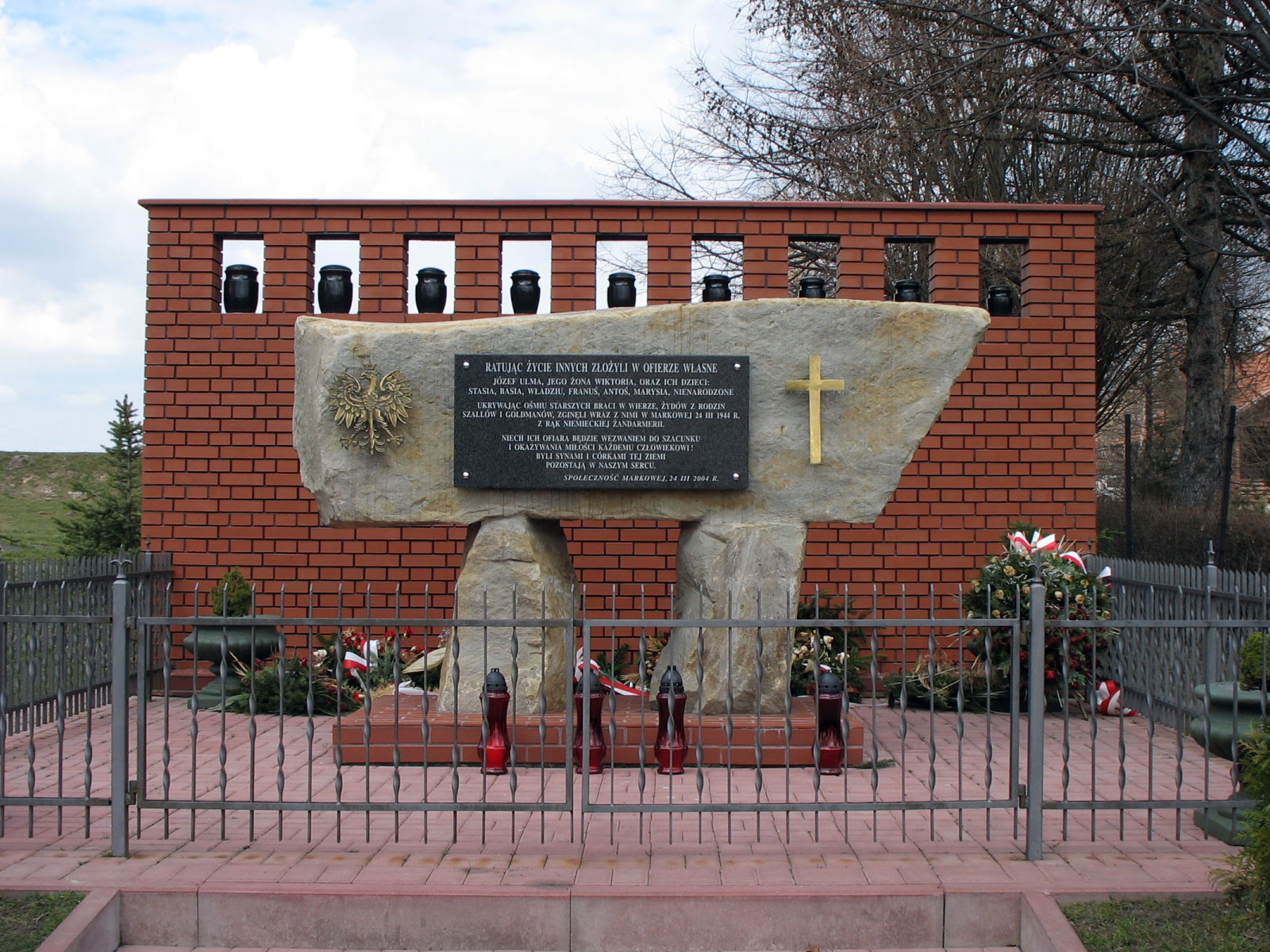Markowa on:
[Wikipedia]
[Google]
[Amazon]
Markowa is a
 During
During
 *
*
The Righteous and their world. Markowa through the lens of Józef Ulma, by Mateusz Szpytma
Story of the survival of the Riesenbach family
* Gisele Hildebrandt, Otto Adamski. Dorfimfersuchungen in dem alten deutsch-ukrainischen Grenzbereich von Landshuf. 1943.
Markowa
{{Authority control Villages in Łańcut County 14th-century establishments in Poland Populated places established in the 14th century
village
A village is a clustered human settlement or community, larger than a hamlet but smaller than a town (although the word is often used to describe both hamlets and smaller towns), with a population typically ranging from a few hundred ...
in Łańcut County
__NOTOC__
Łańcut County ( pl, powiat łańcucki) is a unit of territorial administration and local government (powiat) in Subcarpathian Voivodeship, south-eastern Poland. It came into being on January 1, 1999, as a result of the Polish local gove ...
, Subcarpathian Voivodeship
Subcarpathian Voivodeship or Subcarpathia Province (in pl, Województwo podkarpackie ) is a voivodeship, or province, in the southeastern corner of Poland. Its administrative capital and largest city is Rzeszów. Along with the Marshall, it i ...
, in south-eastern Poland. It is the seat of the gmina (administrative district) called Gmina Markowa. It lies approximately south-east of Łańcut and east of the regional capital Rzeszów
Rzeszów ( , ; la, Resovia; yi, ריישא ''Raisha'')) is the largest city in southeastern Poland. It is located on both sides of the Wisłok River in the heartland of the Sandomierz Basin. Rzeszów has been the capital of the Subcarpathian ...
. The village has a population of 4,100.
History
The village was founded in the 14th century by the Polish noble family of Pilecki, and was settled by the descendants of Germans colonists, who called it ''Markhof''. The Pileckis also founded a Catholic parish in the village. During
During World War II
World War II or the Second World War, often abbreviated as WWII or WW2, was a world war that lasted from 1939 to 1945. It involved the vast majority of the world's countries—including all of the great powers—forming two opposing ...
it was under German occupation.
On 24 March 1944 a patrol of German police came to the house of Józef and Wiktoria Ulma, where they found eight Jewish members of the Szall and Goldman families. At first the Germans executed all the Jews. Then they shot the pregnant Wiktoria and her husband. When the six children began to scream at the sight of their parents' bodies, Joseph Kokott, a German police officer (Volksdeutsche
In Nazi German terminology, ''Volksdeutsche'' () were "people whose language and culture had German origins but who did not hold German citizenship". The term is the nominalised plural of '' volksdeutsch'', with ''Volksdeutsche'' denoting a sin ...
from Sudetenland), shot them after consulting with his superior. The other killers were Eilert Dieken, Michael Dziewulski and Erich Wilde. Afterwards the Germans robbed the house and workshop of the Ulma family and organized an alcoholic libation. On the 60th anniversary of this tragedy, a memorial was erected in memory of the family. Other Polish families also hid Jews in Markowa, and at least 17 Jews survived the German occupation and the Holocaust
The Holocaust, also known as the Shoah, was the genocide of European Jews during World War II. Between 1941 and 1945, Nazi Germany and its collaborators systematically murdered some six million Jews across German-occupied Europe; ...
in five Polish homes.
The Markowa Ulma-Family Museum of Poles Who Saved Jews in World War II
The Markowa Ulma-Family Museum of Poles Who Saved Jews in World War II is a museum located in Markowa, Poland. The Łańcut Castle Museum began the Ulma-Family Museum's construction in 2013, and the new Museum opened on 17 March 2016.
On 30 J ...
is located in the village.
See also
 *
* Walddeutsche
Walddeutsche (lit. "Forest Germans" or ''Taubdeutsche'' – "Deaf Germans"; pl, Głuchoniemcy – "deaf Germans") was the name for a group of German-speaking people, originally used in the 16th century for two language islands around Łańcut a ...
* Rescue of Jews by Poles during the Holocaust
References
Bibliography
The Righteous and their world. Markowa through the lens of Józef Ulma, by Mateusz Szpytma
Institute of National Remembrance
The Institute of National Remembrance – Commission for the Prosecution of Crimes against the Polish Nation ( pl, Instytut Pamięci Narodowej – Komisja Ścigania Zbrodni przeciwko Narodowi Polskiemu, abbreviated IPN) is a Polish state resea ...
, Poland
* Franciszek Kotula, "Pochodzenie domów przysłupowych w Rzeszowskiem." ''Kwartalnik Historii Kultury Materialnej'' Jahr. V., Nr. 3/4, 1957, S. 557Notes
External links
Story of the survival of the Riesenbach family
* Gisele Hildebrandt, Otto Adamski. Dorfimfersuchungen in dem alten deutsch-ukrainischen Grenzbereich von Landshuf. 1943.
Kraków
Kraków (), or Cracow, is the second-largest and one of the oldest cities in Poland. Situated on the Vistula River in Lesser Poland Voivodeship, the city dates back to the seventh century. Kraków was the official capital of Poland until 1596 ...
Markowa
{{Authority control Villages in Łańcut County 14th-century establishments in Poland Populated places established in the 14th century